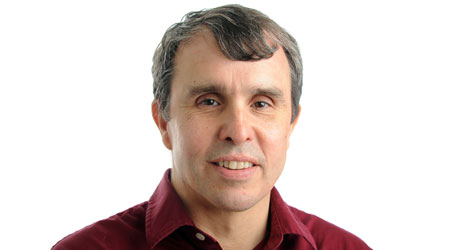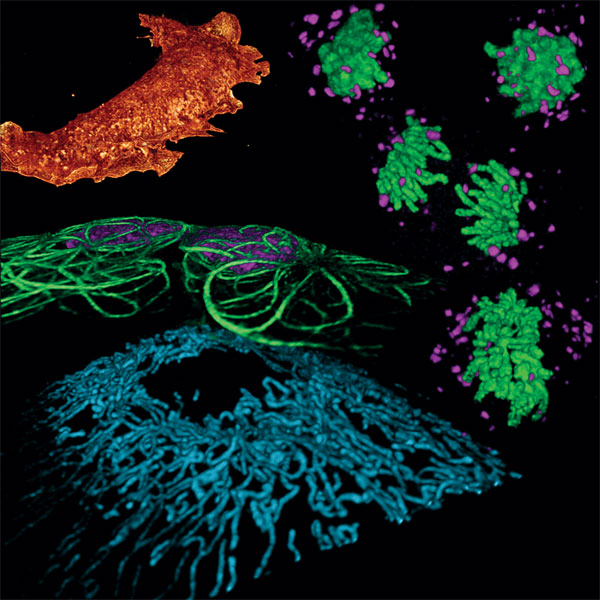Microscopy Pioneer to Kick Off MBL Friday Evening Lecture Series, June 22 with “Pushing the Envelope in Biological Fluorescence Microscopy”

FOR IMMEDIATE RELEASE: Wednesday, June 13, 2012 Contact: Gina Hebert, Senior Publicist/Development Communications, Marine Biological Laboratory, Phone: (508) 289-7725, E-Mail: ghebert@mbl.edu
MBL, Woods Hole, MA – Optical microscopy has remained at the forefront of biological discovery for centuries. However, as the understanding of biological systems as increased, so has the complexity of questions and the need for more advanced optical tools to answer them.
Physicist and engineer Dr. Eric Betzig, a Group Leader at the Howard Hughes Medical Institute’s Janelia Farm Research Campus, will discuss new technologies he’s developing for ultra-high resolution imaging at the next MBL (Marine Biological Laboratory) Friday Evening Lecture on Friday, June 22. The lecture, “Pushing the Envelope in Biological Fluorescence Microscopy” will be held at 8:00 PM in the MBL's Lillie Auditorium, 7 MBL Street, Woods Hole. The event is free and open to the public.
 Dr. Eric Betzig
Dr. Eric BetzigA pioneer in the development of near-field microscopy for ultra-high resolution imaging, Dr. Betzig spent six years at AT&T’s Bell Laboratories, six years as Vice President of Research and Development at his father's machine tool company, and three years in his own research and consulting venture. In this latter role, he and Harald Hess invented PALM, a microscope capable of imaging intracellular proteins at near-molecular resolution.
In 2010, Dr. Betzig and his team at the Janelia Farm Research Campus invented Bessel beam plane illumination microscopy, a method that uses an exquisitely thin sheet of light to peer inside single living cells, revealing their internal three-dimensional dynamics in unprecedented detail. Over the course of three summers, Dr. Betzig and his team have tested the PALM and Bessel microscopes with students and faculty in the MBL’s Physiology course.
 Cellular structures as seen by Bessel beam plane illumination microscopy. Clockwise from upper left: membrane ruffles in a monkey kidney cell; chromosomes (green) and golgi (magenta) in a dividing pig kidney cell; mitochondria in a living pig kidney cell; and microtubules (green) and nuclei (magneta) in a pair of human osteosarcoma cells (E. Betzig).
Cellular structures as seen by Bessel beam plane illumination microscopy. Clockwise from upper left: membrane ruffles in a monkey kidney cell; chromosomes (green) and golgi (magenta) in a dividing pig kidney cell; mitochondria in a living pig kidney cell; and microtubules (green) and nuclei (magneta) in a pair of human osteosarcoma cells (E. Betzig).Dr. Betzig received his B.S. in Physics from the California Institute of Technology and his Ph.D. in Applied & Engineering Physics from Cornell University. He holds numerous patents for his inventions and has received the National Academy of Sciences Award for Initiatives in Research (1993), and the William L. McMillan Award (1992).
The Friday Evening Lecture Series will continue throughout the summer at the MBL. The remaining lectures in the series are below. For more information, visit mbl.edu/FEL
June 29, 2012
"Genetics of Complex Traits in the Domestic Dog"
Elaine A. Ostrander, National Human Genome Research Institute
July 6, 2012
"Deconstructing the Complexity of Vertebrate Limb and Spinal Cord Regeneration"
Elly M. Tanaka, Center for Regenerative Therapies, Technische Universität Dresden
July 13, 2012
"Earth at Seven Billion"
Jesse H. Ausubel, The Rockefeller University
July 20, 2012
Forbes Lecture
"Using Deadly Cone Snails to Understand Nervous Systems"
Baldomero M. Olivera, University of Utah; Howard Hughes Medical Institute
July 27, 2012
"Is Science Revolutionary? Thomas Kuhn and the Structure of Science"
Jed Z. Buchwald, California Institute of Technology and Paul Hoyningen-Huene, University of Hannover, Germany
August 3, 2012
Glassman Lecture
"Protein Folding in the Cell: The final Step of Information Transfer" - Arthur L. Horwich, Yale University, Howard Hughes Medical Institute
August 10, 2012
Joshua Lederberg Lecture
"Food and Sex: The Neurogenetics of Innate Behavior"
Leslie B. Vosshall, The Rockefeller University; Howard Hughes Medical Institute
August 17, 2012
Sager Lecture
"How Bacteria Talk To Each Other"
Bonnie L. Bassler, Princeton University; Howard Hughes Medical Institute
—### —
The Marine Biological Laboratory (MBL) is dedicated to scientific discovery and improving the human condition through research and education in biology, biomedicine, and environmental science. Founded in 1888 in Woods Hole, Massachusetts, the MBL is an independent, nonprofit corporation.